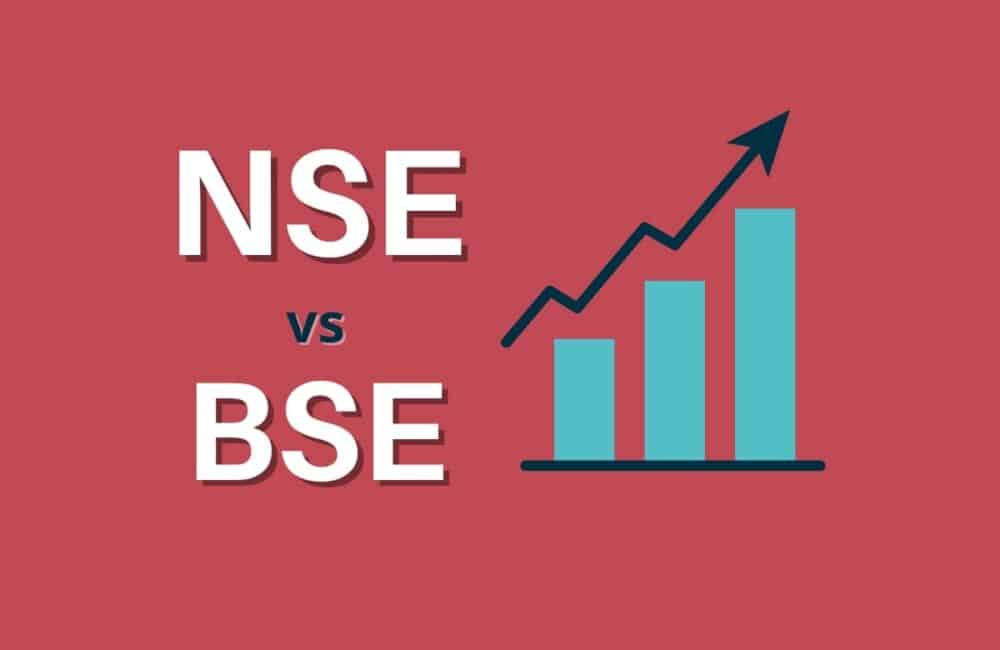NSE and BSE are different stock exchanges but not in the way you might think.
Practically every day you hear about NSE, BSE, and the stock market. If you are willing to invest in the stock market, you must know what is the difference between NSE and BSE? Though there are many similarities, NSE and BSE differ in many things.
What Is NSE?
NSE stands for National Stock Exchange. NSE(National Stock Exchange) is a stock exchange that was incorporated in 1992 by banks and financial institutions including ICICI, Industrial Finance Corporation of India, IL&FS, Punjab National Bank, and General Insurance Corporation. It is located in Mumbai.
SEBI recognized The National Stock Exchange of India Ltd. as a stock exchange in 1993. In the next year, it operationalized its functions. The declared vision of NSE is “to facilitate the financial well-being of people”, “to continue to be a leader”, and “establish global presence”.
In terms of market capitalization, NSE is the second-largest stock exchange in India. The products offered for trading on NSE are classified into 3 groups:
- Capital market for the listing and trading of equities
- Fixed-income securities, and
- derivatives market
NSE consists of a 50-share index and a 500-share index, commonly known as S&P CNX-50 and S&P CNX-500 respectively. The NSE has developed as the largest financial market in India and the fourth largest in the world in terms of trading volume.
National Stock Exchange 50 or “Nifty 50” was launched in 1996 and is considered as the benchmark and flagship index of NSE. Nifty 50 identifies the stocks of the top 50 companies listed on the exchange. The stocks of these 50 largest companies provide a good reflection of various sectors of the Indian economy.
Do you know?
NSE was the first stock exchange in India to provide a modern, fully automated electronic trading platform to investors.
It is also frequently used by investors to gain insight into the Indian stock market. Among the biggest stock exchanges in the world, NSE is at the 4th position (based on equity trading volume). NSE was declared in 2019 as the world’s largest derivatives exchange by WFE (World Federation of Exchanges).
What Is BSE?
BSE(Bombay Stock Exchange) is the oldest stock exchange in India and Asia. It was established in the year 1875. The Bombay Stock Exchange Ltd. Used to be a regional stock exchange. It was converted into a national stock exchange in the year 2002.
Both BSE and NSE offer trading platforms, but in terms of market capitalization, BSE is the biggest stock exchange in India. It is also the fifth-largest stock exchange in the world (market capitalization).
BSE provides exceptional trading opportunities in debt instruments, derivatives, mutual funds, equity, and currencies. BSE has included the Small and Medium Enterprises (SME) platform “BSE SME”, which has successfully listed over 250 companies.
India’s most widely tracked bellwether stock market benchmark index, S&P BSE SENSEX, or commonly known as SENSEX is an index of BSE. It measures the performance of the 30 largest companies that are trading and listed on BSE.
India’s 1st international exchange India INX, located at “GIFT CITY IFSC” in Ahmedabad was also launched by BSE.
The history of BSE is outstanding and represents the history of India’s securities market. The first stock exchange in the country to be granted permanent recognition under the Securities Contract Regulation Act, 1956, was the Bombay Stock Exchange.
Do you know?
BSE accounts for almost 75% of all stocks traded in India. BSE was started under a banyan tree and in 2017, it became the first listed stock exchange of India.
What Is The Difference Between NSE And BSE?
Both NSE and BSE are real indicators of the market sentiment and are used by investors worldwide to have an insight into the Indian economy. However, there are many differences between the two.
Major differences between NSE and BSE are summarised in the following points:
- BSE is the oldest stock exchange in India and NSE is the youngest stock exchange in India.
- In the Global rankings of stock exchanges, BSE is at the 10th rank while NSE is at the 11th rank.
- NSE’s benchmark index “nifty 50” traces the top 50 companies listed on NSE while BSE’s Sensex lists the shares of the top 30 companies traded on BSE.
- NSE was recognised by SEBI as a stock exchange in 1993, while BSE was recognised in 1957 (even before SEBI came into existence).
- NSE was the first fully automated screen-based and dematerialized electronic exchange of India whereas BSE has been in the stock market business since the second half of the 19th century.
NSE Vs BSE: Key Differences
| Topic | NSE | BSE |
| Established | 1992 | 9 July 1875 |
| Global Rank | 11th | 10th |
| Benchmark Index | Nifty | Sensex |
| Total Listed Companies | 1700+ | 5749+ |
| Liquidity | NSE has more liquidity than BSE | Lower than NSE |
| Market Capitalization | $3.1 trillion | $3.2 trillion |
| Speed | Behind BSE | Fastest in the World |
| Trading | Stocks, IDRs, ETFs and units of closed-ended mutual fund schemes, derivative contracts on Equity, Indices, Currency, Interest Rates and Commodities, Government securities, Corporate Bonds, Sovereign Gold Bonds, and other debt securities | Debt instruments, derivatives, mutual funds, equity, and currencies |
NSE Or BSE: Which Is Better?
Both the stock exchanges have state-of-the-art infrastructure to offer cutting-edge technological prowess to trade and deal in stocks. They are the backbone of the Indian financial market. Both NSE and BSE have similar trading mechanisms. Registered brokers are required to trade via exchanges.
However, if the question arises “Which is better NSE or BSE?”, then it is an individual choice and depends on the company in which an investor wants to invest. Suppose a person wants to invest in Company X which is only listed on BSE, then he will have no other choices.
Similarly, if a stock is listed only on NSE, and an investor wants to invest in that particular stock, he will have to mandatorily invest through the NSE platform.
Some experts are of the view that BSE is more suitable for new investors or beginners and NSE is for seasoned and experienced investors.
NSE or BSE is a matter of choice. The main objective of exchanges like NSE or BSE is to facilitate and provide trading services to investors who want to invest in Indian stocks of listed companies.
Final Thoughts
A stock market is an organized market to trade (buy and sell) shares of listed companies. Bombay Stock Exchange and the National Stock Exchange are the two biggest and prominent stock exchanges of India. Though BSE is the oldest stock exchange in India, NSE has also emerged as an important player.
In the last, it can be concluded that both NSE and BSE are secure and regulated by the government watchdog Securities and Exchange Board of India.
Frequently Asked Questions
How To Invest In NSE Or BSE?
For trading on NSE or BSE, you need to open an online trading and Demat account. You must also connect with a SEBI registered broker. Thereafter, you must move funds from your bank account to your Demat account for investing in stocks.
How Does A Company Get Listed On NSE Or BSE Platforms?
A company willing to be listed on NSE or BSE and planning to bring out the Initial Public Offering (IPO) will be eligible to be included in the indices if it fulfils the eligibility criteria. These eligibility criteria include but are not limited to market capitalization, impact cost, and floating stock etc.
What Is The Role Of SEBI In NSE And BSE?
SEBI or Securities and Exchange Board of India is the government regulator of the securities and commodity markets in India. Hence NSE and BSE come under the purview of SEBI.
How Many Companies Are Listed On NSE And BSE?
At present, there are 5749 listed companies on NSE and more than 1700 listed companies on BSE.



